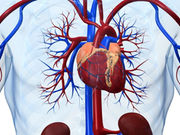The effect was exaggerated with larger average daily temperatures
THURSDAY, March 1, 2018 (HealthDay News) — Large changes in temperature are associated with increased risk of ST-segment elevation myocardial infarction (STEMI), according to a study scheduled to be presented at the annual meeting of the American College of Cardiology, held from March 10 to 12 in Orlando, Fla.
Hedvig Bille Andersson, M.D., from the University of Michigan in Ann Arbor, and colleagues obtained daily minimum, maximum, and average temperatures on hospital zip code level, and examined the absolute temperature change (ΔT; maximum difference in temperature on the day of STEMI presentation and the day before) in Michigan from 2010 to 2016. Data were included for 30,404 STEMI patients presenting at 45 hospitals.
The researchers found that the mean ΔT was 13 degrees Celsius. There was a correlation for larger ΔT with increased risk of STEMI (RR, 1.02 for every 5 degrees Celsius change). Larger average daily temperatures exaggerated the effect.
“Our study suggests that such fluctuations in outdoor temperature could potentially lead to an increased number of heart attacks and affect global cardiac health in the future,” Andersson said in a statement.
Copyright © 2018 HealthDay. All rights reserved.








